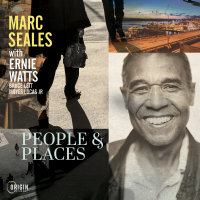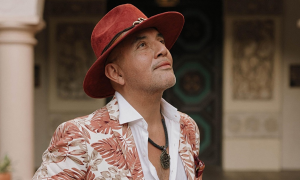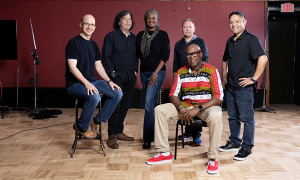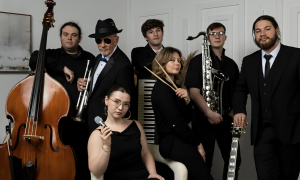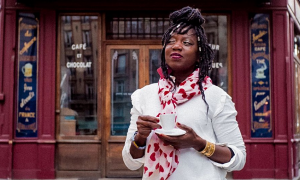Home » Jazz Articles » Take Five With... » Take Five with Q Morrow
Take Five with Q Morrow
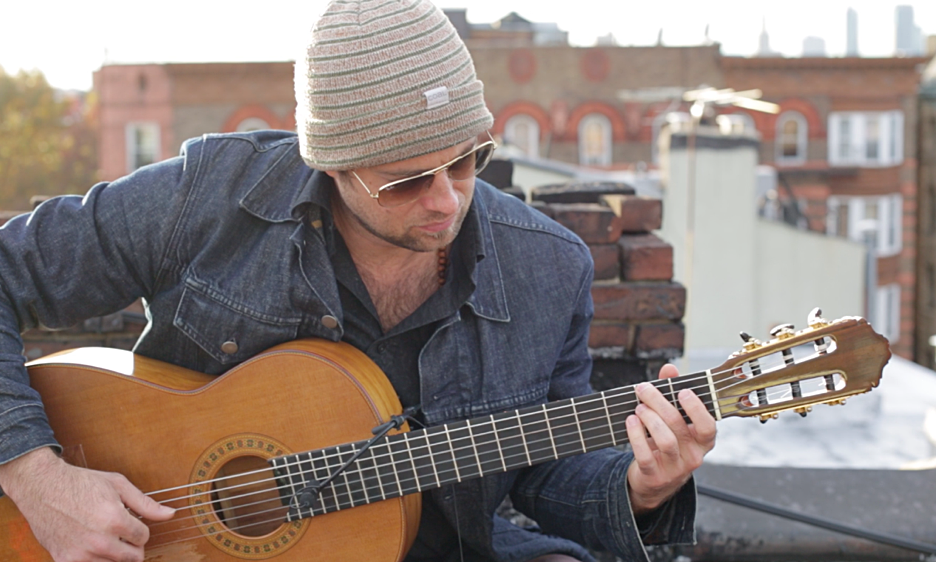
Meet Q Morrow
Based in New York City, Q is an eclectic modern guitarist. At home in many different styles of music such as jazz, R&B, Brazilian styles such as Samba, Forro, and Choro, Karnatic, and Afro Cuban music as well, Q is a true musical citizen of the world, deeply internalizing all of this music and making it his own, resulting in a very broad palette he draws from. These influences show particularly well in his compositions, on full display on his two albums of original music All Around Dude and the recently released There Are Stars in Brooklyn. Q maintains a busy schedule as a sideman and a band leader in NYC at clubs such as the 55 Bar, Cornelia St Cafe, Zinc Bar, and jazz festivals around the world.Instrument(s):
Guitar. I mainly play nylon string acoustic (a Glenn Canin flamenco negra and a Cervantes Palo Escrito), a Victor Baker archtop, and a G&L Legacy strat. I started music studying violin for 3 years when I was 9 years old. I also played a lot of drums in my formative years.Teachers and/or influences?
I studied with Christine Greene in Boise, ID for two years when I was 12. I was then self taught until I attended Cabrillo College in Santa Cruz, CA. Some of my favorite teachers there were Ray Brown, Mickey McGushin, and Lou Harrison. I then attended the University of North Texas where I studied with Poovalur Srinivassan,
Lynn Seaton
bassb.1957
Some major influences would include:
In no particular order:

Joe Pass
guitar1929 - 1994

Charlie Parker
saxophone, alto1920 - 1955

Seu Jorge
guitarb.1970

Muddy Waters
guitar1915 - 1983

John Coltrane
saxophone1926 - 1967

Joao Gilberto
vocals1931 - 2019

Tomatito
guitarb.1958

McCoy Tyner
piano1938 - 2020

Bill Evans
piano1929 - 1980

Miles Davis
trumpet1926 - 1991

Wes Montgomery
guitar1923 - 1968

Elis Regina
vocalsb.1945
I knew I wanted to be a musician when...
My first band Fat James and the Three Fats got booed off the stage and had oranges thrown at us at a community event in Caldwell, ID when I was 14 over our inappropriate lyrics. That was my first public performance and it was exhilarating! I was instantly hooked when I saw what an impact music could have.Your sound and approach to music.
I love the intimacy of acoustic instruments. I think that's the main reason I gravitate towards the nylon string guitar rather than the more popular electric guitar. I'm constantly learning about new styles and absorbing ideas into my style. Usually this happens because I'll have to learn music that I'm unfamiliar with for a gig. If it resonates with me, I'll dig deep into it long after I play the gig. I always try and immerse myself in the culture that different music styles comes from, playing with and learning from musicians from that area of the world. This is something I've done with Cuban, Carnatic, Brazilian styles, and jazz. After I've become competent in a style of music, I look for ways to incorporate it into the other styles I play. I'm always looking for the places where genres meet and things that they have in common. I love the mixing of cultures. It's beautiful and has always been a part of what jazz has been all about.Road story:
Bringing my band back to my hometown of Boise, ID earlier this year to a sold out show of over 200 people at Cinder. Seeing the audience in Boise come out in such force and appreciate my complicated and exotic music was validating. At one point the crowd went wild over a drum solo in 7/8 with a fairly complex guitar montuno accompaniment!Favorite venue
I love the jazz clubs in NYC like 55 Bar, Cornelia St. Cafe, Zinc Bar, and Mezzrow.What do you think is the most important thing you are contributing musically?
I try my best to write things that sound fresh but also resonate with audiences. I'm combining things in ways that haven't been done before in quite such an organic way. I'm constantly exploring new ideas in my compositions, however difficult they may be to pull off live!The first jazz album I bought was:
Maybe the Modern Jazz Quartet The Complete Last Concert. This album still gives me goosebumps. It has everything: deep groove, interesting arrangements, an element of the blues, excellent solos, space, vision. Their version of "Confirmation" really grabbed me because the melody and harmony was so complex but their performance came off so catchy and accessible. Others I heard early on was a compilation album of Joe Pass that I loved, and I used to check out 78 and 45 vinyl records of
Fats Waller
piano1904 - 1943

Benny Goodman
clarinet1909 - 1986

Duke Ellington
piano1899 - 1974

Django Reinhardt
guitar1910 - 1953
How would you describe the state of jazz today?
Jazz today has good and bad qualities. Sometimes it seems that jazz artists today are used to being put on a pedestal by other musicians and don't really try to make any kind of emotional connection with the audience, as if their competency or virtuosity on their instrument will suffice. For me jazz should go deeper than that. As a listener I want to feel the pain and suffering of the world washed away by the music. On the other hand, there are many, many competent musicians playing jazz today from all over the world, some of which have their own unique voice or something to add to the jazz tradition. The appreciation and enthusiasm shown for jazz worldwide is encouraging.What are some of the essential requirements to keep jazz alive and growing?
Community. Established players need to be out hanging and playing with younger players at sessions. We need to support and encourage our fellow musicians. This is certainly happening in NYC and it's probably why it's one of the best places on the planet to be a musician. Giants of jazz such as
Roy Hargrove
trumpet1969 - 2018

Lou Donaldson
saxophone1926 - 2024
What is in the near future?
I'm currently booking dates for a US tour in support of my new album There Are Stars in Brooklyn for winter/spring 2019, and Europe in summer 2019. Other albums I plan to record in the future are an album of solo guitar, an album of my arrangements of Brazilian music, an album collaborating with different singers. There isn't enough hours in the day to realize all of my dreams!If I weren't a jazz musician, I would be a:
If I wasn't a musician, it would be hard to find my place in the world. I would probably be seeking adventure of some kind: sail or bicycle around the world or some other kind of perpetual travel. Other vocations I would be capable of would be cook, mechanic, sailor, or farmer. I'm sure I would go crazy if I wasn't playing and writing music though.Tags
Comments
PREVIOUS / NEXT
Support All About Jazz
 All About Jazz has been a pillar of jazz since 1995, championing it as an art form and, more importantly, supporting the musicians who make it. Our enduring commitment has made "AAJ" one of the most culturally important websites of its kind, read by hundreds of thousands of fans, musicians and industry figures every month.
All About Jazz has been a pillar of jazz since 1995, championing it as an art form and, more importantly, supporting the musicians who make it. Our enduring commitment has made "AAJ" one of the most culturally important websites of its kind, read by hundreds of thousands of fans, musicians and industry figures every month.



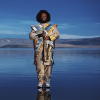


 Buy Now
Buy Now





